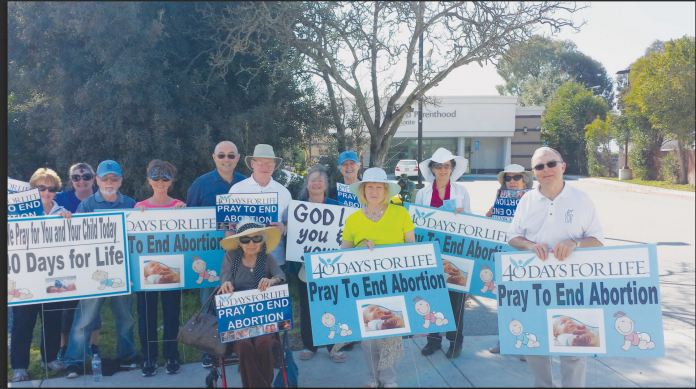Since Feb. 10 anti-abortion protesters have gathered peacefully outside the Planned Parenthood Gilroy Health Center, saying they are determined to quietly change and save lives and support women in need.
Part of an effort that began in a Texas college town 17 years ago and has spread to 22 countries, the 40 Days for Life campaign and its non-confrontational approach to opposing abortion has saved tens of thousands of lives, organizers say.
Bi-annual campaigns in 273 towns and cities around the globe bring together people who participate in quiet prayer vigils at abortion facilities.
The goal, said Gilroy campaign leader Brian Cunningham, is to “provide emotional support to mothers facing a decision to keep her child or not.”
Cunningham, 73, a father of three and a grandfather, has led the Gilroy campaign since 2011, a year after the local effort began.
He likened the approach to that of Mahatma Gandhi, the robed lawyer who led India from colony to nation with peaceful nonviolence.
Its approach is peaceful, non-judgmental, non-confrontational, non-political and draws prayer vigil partners from all faiths, Cunningham said.
His group numbers as many as 20 and shows up mostly at the Renz Lane facility on Wednesdays because that is when most women seek services. He said most of the women are in their teens or early 20s and in college and high school.
The current local vigil is scheduled to end March 20.
Quietly and with prayer signs, Cunningham said, his group tries to let the women know that, “We love you and will try to be with you whatever your needs might be.”
To underscore the group’s commitment to a respectful approach to changing minds, participants are required to sign a “volunteer statement of peace.” In it, they promise to “pursue peaceful solutions . . . show compassion,” and agree not to obstruct Planned Parenthood facilities or threaten or verbally abuse its clients and staff.
Participants also must agree to this statement: “I understand that acting in a violent manner immediately and completely disassociates me from the 40 Days for LIfe campaign.”
On its website, https://40daysforlife.com/, the nonprofit group calls itself “the largest internationally coordinated pro-life mobilization in history, helping people in local communities end the injustice of abortion” through prayer, fasting, community outreach and peaceful vigil. It calls the campaign, “The beginning of the end of abortion.”
Planned Parenthood spokeswoman Lupe Rodriguez called that goal unattainable and suggested the resources spent by the group would be better spent on “better access to birth control and other [pregnancy] preventive services … therefore keeping [women] from having to make the choice of having to have an abortion.”
However, she said, “Abortion has been around since women have been able to be pregnant; the thought that abortion will just disappear with this kind of tactic is unrealistic.”
Of the 40 Days for Life participants, she said, “Many of them are very respectful and very quiet and just try to spread their message, and we are with that, we understand it’s their right to do that.
“What concerns us is when [some groups] come out to protest and are more antagonistic towards our patients and clients and staff, when more aggressive tactics are used,” said Rodriguez, public affairs director for the Mar Monte region of Planned Parenthood, of which Gilroy is a part.
“We know that for most women it’s a very difficult decision,” she said, and one “that we feel should be made on an individual basis.” Women make those decisions after giving careful thought to their lives and that of their families, she said.
At the 40 Days for Life headquarters in Madison, Wisconsin, director of North American campaigns Steve Karlen said that since branching out from College Station, Texas in 2007, “We know of 11,165 lives that have been saved during vigils, 127 abortion workers who have left their jobs and 66 abortion facilities that have closed following campaigns.”
He said abortion rates also have declined in towns where the group is active.
“We are there to be the a sign of help before a decision is made that cannot be undone,” he said, citing research that suggests 80 percent of women who have abortions would not have done so if someone had reached out to them.
While active in 22 countries, the organization says it has involved more than 675,000 participants. It is a “low-cost” operation, according to Karlen, 32, a father of three. Most of its 10 or so leaders in Wisconsin and Texas work from their homes, he said.
There is a $197 fee for campaigns, to pay for resources and assist the international effort, but no one who applies to lead a local effort is turned down for financial reasons, he said.














